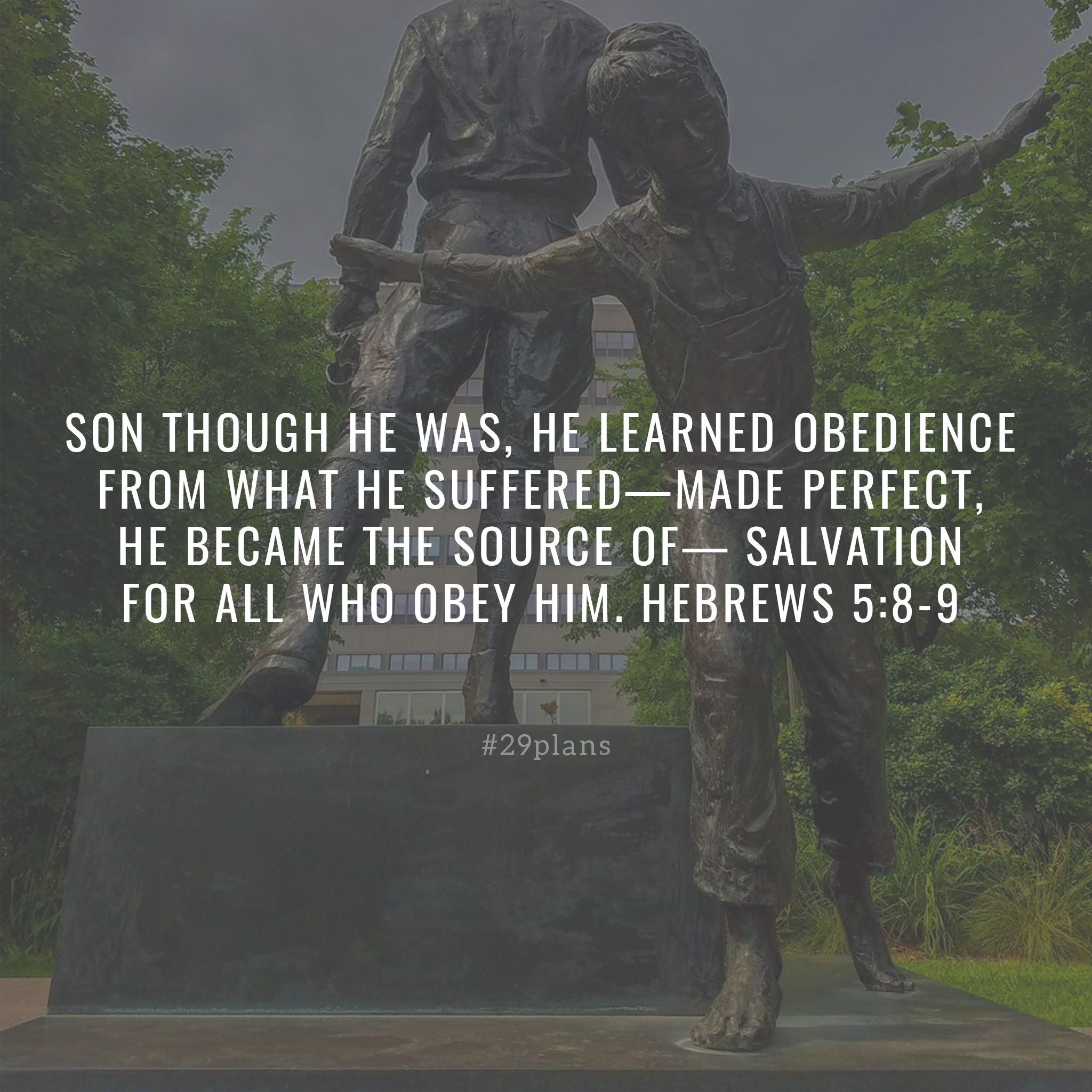Guide: Read 2 Samuel 11; Hebrews 5; Listen to Son of God by @theOutbreakband; Pray for your pastor and church; Journal on Hebrews 5
Verse of the Day: Son though he was, he learned obedience from what he suffered—made perfect, he became the source of—salvation for all who obey him. Hebrews 5:8-9
Song of the Day: Son of God by The Outbreak Band — Youtube
Bible Reading: 2 Samuel 11; Hebrews 5
2 Samuel 11
David and Bathsheba
1 In the spring, at the time when kings go off to war, David sent Joab out with the king’s men and the whole Israelite army. They destroyed the Ammonites and besieged Rabbah. But David remained in Jerusalem.
2 One evening David got up from his bed and walked around on the roof of the palace. From the roof he saw a woman bathing. The woman was very beautiful, 3 and David sent someone to find out about her. The man said, “She is Bathsheba, the daughter of Eliam and the wife of Uriah the Hittite.” 4 Then David sent messengers to get her. She came to him, and he slept with her. (Now she was purifying herself from her monthly uncleanness.) Then she went back home. 5 The woman conceived and sent word to David, saying, “I am pregnant.”
6 So David sent this word to Joab: “Send me Uriah the Hittite.” And Joab sent him to David. 7 When Uriah came to him, David asked him how Joab was, how the soldiers were and how the war was going. 8 Then David said to Uriah, “Go down to your house and wash your feet.” So Uriah left the palace, and a gift from the king was sent after him. 9 But Uriah slept at the entrance to the palace with all his master’s servants and did not go down to his house.
10 David was told, “Uriah did not go home.” So he asked Uriah, “Haven’t you just come from a military campaign? Why didn’t you go home?”
11 Uriah said to David, “The ark and Israel and Judah are staying in tents,[a] and my commander Joab and my lord’s men are camped in the open country. How could I go to my house to eat and drink and make love to my wife? As surely as you live, I will not do such a thing!”
12 Then David said to him, “Stay here one more day, and tomorrow I will send you back.” So Uriah remained in Jerusalem that day and the next. 13 At David’s invitation, he ate and drank with him, and David made him drunk. But in the evening Uriah went out to sleep on his mat among his master’s servants; he did not go home.
14 In the morning David wrote a letter to Joab and sent it with Uriah. 15 In it he wrote, “Put Uriah out in front where the fighting is fiercest. Then withdraw from him so he will be struck down and die.”
16 So while Joab had the city under siege, he put Uriah at a place where he knew the strongest defenders were. 17 When the men of the city came out and fought against Joab, some of the men in David’s army fell; moreover, Uriah the Hittite died.
18 Joab sent David a full account of the battle. 19 He instructed the messenger: “When you have finished giving the king this account of the battle, 20 the king’s anger may flare up, and he may ask you, ‘Why did you get so close to the city to fight? Didn’t you know they would shoot arrows from the wall? 21 Who killed Abimelek son of Jerub-Besheth[b]? Didn’t a woman drop an upper millstone on him from the wall, so that he died in Thebez? Why did you get so close to the wall?’ If he asks you this, then say to him, ‘Moreover, your servant Uriah the Hittite is dead.’”
22 The messenger set out, and when he arrived he told David everything Joab had sent him to say. 23 The messenger said to David, “The men overpowered us and came out against us in the open, but we drove them back to the entrance of the city gate. 24 Then the archers shot arrows at your servants from the wall, and some of the king’s men died. Moreover, your servant Uriah the Hittite is dead.”
25 David told the messenger, “Say this to Joab: ‘Don’t let this upset you; the sword devours one as well as another. Press the attack against the city and destroy it.’ Say this to encourage Joab.”
26 When Uriah’s wife heard that her husband was dead, she mourned for him. 27 After the time of mourning was over, David had her brought to his house, and she became his wife and bore him a son. But the thing David had done displeased the Lord.
–
Footnotes:
- 2 Samuel 11:11 Or staying at Sukkoth
- 2 Samuel 11:21 Also known as Jerub-Baal (that is, Gideon)
Hebrews 5
1 Every high priest is selected from among the people and is appointed to represent the people in matters related to God, to offer gifts and sacrifices for sins. 2 He is able to deal gently with those who are ignorant and are going astray, since he himself is subject to weakness. 3 This is why he has to offer sacrifices for his own sins, as well as for the sins of the people. 4 And no one takes this honor on himself, but he receives it when called by God, just as Aaron was.
5 In the same way, Christ did not take on himself the glory of becoming a high priest. But God said to him,
“You are my Son;
today I have become your Father.”[a]
6 And he says in another place,
“You are a priest forever,
in the order of Melchizedek.”[b]
7 During the days of Jesus’ life on earth, he offered up prayers and petitions with fervent cries and tears to the one who could save him from death, and he was heard because of his reverent submission. 8 Son though he was, he learned obedience from what he suffered 9 and, once made perfect, he became the source of eternal salvation for all who obey him 10 and was designated by God to be high priest in the order of Melchizedek.
Warning Against Falling Away
11 We have much to say about this, but it is hard to make it clear to you because you no longer try to understand. 12 In fact, though by this time you ought to be teachers, you need someone to teach you the elementary truths of God’s word all over again. You need milk, not solid food! 13 Anyone who lives on milk, being still an infant, is not acquainted with the teaching about righteousness. 14 But solid food is for the mature, who by constant use have trained themselves to distinguish good from evil.
–
Footnotes:
- Hebrews 5:5 Psalm 2:7
- Hebrews 5:6 Psalm 110:4
Holy Bible, New International Version®, NIV® Copyright © 1973, 1978, 1984, 2011 by Biblica, Inc.® Used by permission. All rights reserved worldwide.



